Ricerca
Raffina la ricerca
- Parola chiave
- emozioni (9)
- Emozioni (3)
- Intervista (3)
- Storia del pensiero sociologico (3)
- algoritmi (3)
- mutamento sociale (3)
- professioni (3)
- sociologia (3)
- Macroarea
- Sociologia (165)
- Tipo contenuto
- Articolo di rivista (285)
- Editoriali & Opinioni (30)
- Intervista (23)
- Dossier e report (1)
- Sociologia (1)
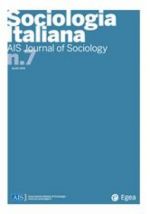
Mobile Ikea e vissuti domestici contemporanei. Analisi micrologica di fenomeni globali (Ikea furniture and the global domestic experience), di Irene Sartoretti
La ricerca esplora il modo in cui il ruolo sempre più centrale assunto dalla mobilità geografica, dalla flessibilità, dalla temporaneità, dall’iper-possibilità di scelta e dai temi relativi alla performance individuale ha importanti ripercussioni sui modi di vivere la casa e di pensare lo spazio domestico. La risonanza fra dinamiche sociali di ampia portata, spazi e vissuti domestici è stata ...
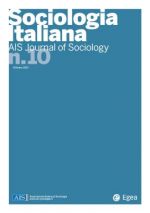
Giovani, nuovi media e percorsi di orientamento nello spazio pubblico (Young people, new media and public space), di R. Marini, G. Fioravanti, M. Gerli, G. Graziani
Il paper propone i risultati di una ricerca che ricostruisce le relazioni tra giovani, uso dei media e spazio pubblico. In questa prospettiva, si cerca di superare i limiti del concetto di partecipazione politica, che non appare adeguato rispetto al modo in cui i giovani percepiscono ed esperiscono il rapporto, non necessariamente engaged , con lo spazio del discorso pubblico. Attraverso interviste ...
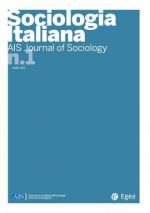
La maternità nelle narrazioni online (Motherhood in online narrations), di A. Cossetta and A. Caliandro
Le mamme contemporanee hanno trovato nel web, un luogo da abitare e nel quale ricomporre quella necessità di narrazione «al femminile» che diviene tanto necessaria durante la gravidanza e il puerperio. È nei forum, blog, social network, che esse concentrano il loro bisogno di espressione e condivisione. La nostra riflessione ci ha condotto proprio nella rete e qui, attraverso la metodologia della ...
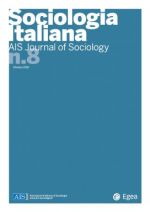
Intervista a Franco Rositi (Interview with Franco Rositi), di Marita Rampazi
Franco Rositi è professore emerito dell’Università di Pavia. Nato il 2 agosto 1938, si è laureato in Lettere classiche ed ha conseguito il diploma alla Scuola Superiore di Comunicazione presso l’Università Cattolica di Milano. Ha insegnato Sociologia urbana, Metodologia delle scienze sociali e Sociologia nelle Università di Milano, Bari e Torino, prima di giungere a Pavia, nel 1990, chiamato ...

La memoria difficile in Italia: trauma culturale e pratiche commemorative della Resistenza (Italy’s difficult past: cultural trauma and commemorations of the Resistance), di L. Mori and L. Migliorati
Lo scopo che il testo si propone è quello di esaminare le potenzialità descrittive della teoria del trauma culturale recentemente proposta da Alexander (2006a, 2012). Com’è noto, nella prospettiva adottata dal sociologo di Yale, la traumaticità è da intendersi non come qualcosa d’inscritto nelle caratteristiche oggettive degli eventi, ma come uno status che gli episodi in questione raggiungono ...
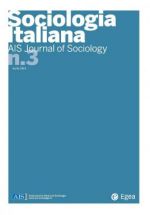
La qualità del sapere sociologico come capacità operativa (Sociological Knowledge as Capacity for Action), di Mauro Palumbo
L’incorporazione a pieno titolo della complessità sociale nella sociologia rende impossibile presentarla come strumento di ingegneria sociale, fornitrice di soluzioni tecniche ai problemi sociali e politici contemporanei. La progressiva divaricazione tra spiegazione e previsione sfida la sociologia a leggere in chiave nuova e diversa la sua spendibilità come scienza, la sua capacità di incidere ...
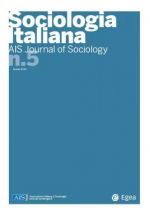
La crisi della vocazione scientifica in Italia tra socializzazione anticipata e precarietà lavorativa (The crisis facing professions in Italy: early socialization and precarious work), di Francesca Colella
Il saggio, presentato al convegno di Parma il 24 gennaio 2015 cui questa sezione è dedicata, propone una riflessione su come le condizioni di instabilità lavorativa nel campo della ricerca scientifica si ripercuotano sull’attività dei lavoratori intellettuali. Infatti, a fronte di politiche – nazionali ma anche europee – che non riconoscono il giusto peso alle condizioni di lavoro nelle università, ...

L’influenza di Herbert Blumer sul pensiero di Anselm Strauss (Herbert Blumer’s influence on the ideas of Anselm Strauss), di Giuseppina Cersosimo
L’articolo analizza il rapporto scientifico intercorso tra Herbert Blumer e Anselm Strauss, quest’ultimo noto in Italia, insieme a Barney Glaser, come metodologo e meno conosciuto come interazionista. Il saggio evidenzia il legame tra allievo e maestro e rintraccia alcune influenze intellettuali di Blumer su teoria e analisi di Strauss.Herbert Blumer’s influence on the ideas of Anselm Strauss The ...
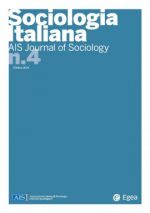
Quale futuro per la professione del sociologo? (What future for the sociological profession?), di Maria Dettori
Profondi cambiamenti, nell’ambito organizzativo delle università italiane dovuti al DM 270 del 2004, accompagnati dalle Direttive e Raccomandazioni approvate a livello europeo comunitario sulla costituzione del Quadro europeo delle qualifiche per l’apprendimento permanente, e dall’approvazione della Legge 4 del 2013 sulle professioni non incardinate negli Ordini professionali, aprono uno scenario, ...
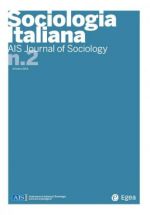
Chi l’ha visto? Una ricerca di sfondo sulla presenza del sociologo nei media mainstream (Missing in action? Sociology in the public eye. A study of the figure of the sociologist in the media), di D. Borrelli and M. Gavrila
Scopo dell’articolo è rilevare la presenza del discorso sociologico nella sfera pubblica dei media. Dopo aver fatto una sommaria ricognizione nell’ambito dei quotidiani e della rete, l’indagine si concentra sulle trasmissioni informative delle reti televisive di servizio pubblico. La ricerca ha permesso di rilevare che nei media mainstream, e in particolare in tv, sono tutt’altro che assenti ...